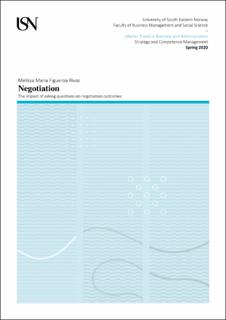| dc.description.abstract | Negotiation has been a practically attractive and a theoretically interesting subject to study for a long time (Bazerman, Curhan, Moore & Valley 2000). Negotiation researchers have investigated the negotiation processes that can categorize negotiations as successful, and the psychology behind negotiation. However, there are still some factors that have not been fully understood and/or researched on. One such factors is the amount of questions asked during a negotiation. Negotiation researchers and practitioners often encourage the use of questions in negotiation and mention the importance of using questions but do not mention how important it might be for the negotiation.
I will use my master thesis to systematically examine the connection between the amount of questions asked during a negotiation and the negotiation outcomes. In order to see how questions can affect negotiation outcomes, I have decided to examine both objective- and subjective outcomes. Regarding objective outcomes, I investigate if individual- and joint profits are affected by the amount of questions asked in a negotiation. Regarding subjective outcomes, I examine if asking questions in a negotiation affect the satisfaction level of the negotiator. I have reviewed negotiation, communication, and questions literatures to obtain information about my research
topic, design, and data collection.
The data collection has been conducted with an experimental research design approach within quantitative research. As participants, I used students enrolled in a bachelor-level negotiation course at the University of South-Eastern Norway, Campus Ringerike, for my research. They were divided into two groups; experimental and control. Both groups were given the same negotiation scenario
and were given a role of either buyer or seller. The participants in the experimental group were manipulated by being told to view the negotiation as an opportunity to learn more about their counterparts and were encouraged to ask as many questions as possible during the negotiation process. The participants in the control group, however, were not given any such instructions. The participants were afterwards were asked to answer a survey that I had developed in Qualtrics. The questionnaire in the survey was divided into five parts; (1) Control questions for finding out which group they were in, age, sex and what kind of role they were given, (2) Preparation-related questions for finding out how the participant prepared for the negotiation, (3) Process-related and agreement-related questions for capturing the amount of questions asked, information exchanged, and the details of their final negotiated agreement, (5) Satisfaction-related questions for measuring how satisfied they were with their agreement, and (6) Exploratory questions for checking their attentiveness, effort, and language problems during the negotiation.
The results from my research has shown that asking questions in a negotiation has a positive effect on the objective outcome, especially in terms of joint profits. However, it does not have a significant effect on the subjective outcome, measured by satisfaction. Overall, the research results indicate that asking questions in a negotiation can be useful for facilitating information exchange and for establishing an agreement that benefits both parties. | en_US |
